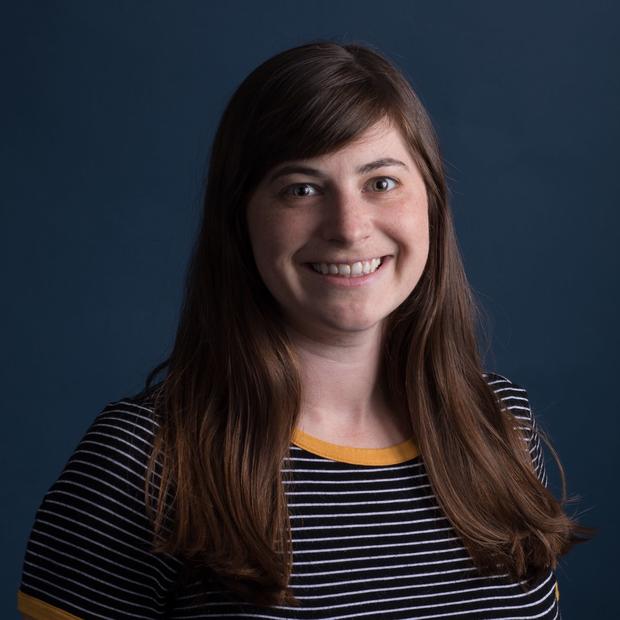
A look at life during a pandemic. On the surface, our communities are slumbering, as the vast majority of Washington’s citizens are homebound. Empty businesses and roadways offer a daily reminder of the risks the coronavirus presents. How we work, live, play and interact have all shifted. From the front lines to those in isolation, COVID-19 has affected everyone and behind every door, stories unfold. See more stories here.
Support for The New Normal is provided by Comcast. All news stories on Crosscut are controlled by our editorial team. Visit our about us page to learn more about Crosscut's editorial independence policy.
Transcript
00:00:01,867
(alarm rings)
00:00:06,200
Jesse Erasmus: Alexa, stop.
00:00:09,167
Jesse Erasmus: OK, I gotta get dressed.
00:00:14,900
Jesse Erasmus: I have a sense of guilt sometimes when I'm at home and I'm browsing Twitter, and I'm seeing all this work going on and people being in a lab 24/7, and I almost feel like I'm not doing enough.
00:00:27,700
Jesse Erasmus: I'm working more than I usually work, which is already quite a bit.
00:00:33,73
Jesse Erasmus: Ten to 14 hours a day, probably.
00:00:38,033
Jesse Erasmus: Trying to protect humanity from a number of diseases.
00:00:41,467
Jesse Erasmus: My goal in life is to contribute to that.
00:00:44,633
(Gentle music)
00:00:51,000
Jesse Erasmus: I grew up in South Africa, and while I was there I had encephalitis as a child.
00:00:56,000
Jesse Erasmus: And so I think since that experience, I've always been curious about viral diseases in particular.
00:01:01,600
Jesse Erasmus: When I moved to Seattle to start my post-doc, there was a Zika outbreak.
00:01:05,667
Jesse Erasmus: So I worked on a vaccine for Zika at that point.
00:01:08,267
Jesse Erasmus: But of course those diseases never reached the global proportion that we see today with COVID-19.
00:01:17,367
Jesse Erasmus: We could study it right here in our backyard.
00:01:19,267
Jesse Erasmus: That's exactly why I'm drawn to science ... the opportunity to work on things that we don't know a lot about.
00:01:29,200
Jesse Erasmus: What I have been working on for the last four years is what's called RNA vaccines.
00:01:33,933
(Gentle music)
00:01:38,800
Jesse Erasmus: So RNA is basically a piece of code like you would think of in software engineering.
00:01:44,833
Jesse Erasmus: We can encode the sequence for that protein, and we can deliver that RNA directly into your cells, and your cells will basically become this manufacturing facility and produce the protein in your own body.
00:01:58,400
Jesse Erasmus: And now your immune system could come and interact with those proteins, and ideally those antibodies will neutralize the actual virus if you ever come into contact with it.
00:02:08,067
Jesse Erasmus: So it went from clear to somewhat white and milky, and that's because the RNA is interacting with the formulation, and the particle size is growing.
00:02:18,500
Jesse Erasmus: RNA vaccines that are currently being used in humans as a product, zero.
00:02:24,600
Jesse Erasmus: COVID-19 could potentially be probably one of the first RNA vaccine products, if it makes it past all three of the clinical trials.
00:02:33,967
Jesse Erasmus: There's definitely more urgency at this point.
00:02:36,900
Jesse Erasmus: The time that it takes to develop a vaccine, it's historically 10 to 20 years.
00:02:43,567
Jesse Erasmus: The fact that we're trying to do this in one to two years is a huge change.
00:02:53,933
Jesse Erasmus: Since the outbreak, though, the ferry schedule has been all messed up, so my time in the lab is shortened significantly.
00:03:03,433
Jesse Erasmus: I am trying to do this work, but at the same time I'm also trying to maintain social distancing, so that I come home to my family I want to make sure my family's safe.
00:03:13,633
[Children:] Hi, Daddy.
00:03:14,933
Jesse Erasmus: Oh, hey guys.
00:03:17,367
Jesse Erasmus: I have a 3-, a 6- and a 9-year-old.
00:03:20,633
Jesse Erasmus: What did you guys do today?
00:03:23,56
Jesse Erasmus: They don't fully comprehend what's going on.
00:03:25,900
Jesse Erasmus: My son the other day was so upset that he found out that he's not going on his field trip.
00:03:31,500
Jesse Erasmus: We had to tell him there's no field trips going on anywhere right now.
00:03:35,167
Jesse Erasmus: He doesn't fully grasp that, but so the hardest part, I guess, is the disappointment.
00:03:42,433
Jesse Erasmus: I haven't really thought too much about my personal reaction to the outbreak.
00:03:51,233
Jesse Erasmus: My wife always says that she's struggling with dealing with this and how this is gonna impact humanity. And, meanwhile, I'm just happy-go-lucky, my normal self.
00:04:03,233
Jesse Erasmus: I'm just so focused on the work that I'm not really thinking too much about how this is impacting personal lives.
00:04:09,267
Jesse Erasmus: Working on this and staying busy and just focusing on this is just helping me to cope.
00:04:14,067
Jesse Erasmus: I think vaccines are going to be very important in the long run.
00:04:20,100
Jesse Erasmus: We can maintain social distancing and we can continue to flatten the curve, but if we resume normal daily life activities, we are very likely gonna see an increase in case counts again.
00:04:32,767
Jesse Erasmus: I think vaccines are essential to protecting the human race from infectious diseases, period.
00:04:40,067
Jesse Erasmus: I guess it's definitely opened up my eyes to the fact that we're pretty fragile.
00:04:44,633
Jesse Erasmus: We can definitely be rapidly impacted by something as small as a virus.
00:04:52,100
Jesse Erasmus: And it definitely makes me feel like I've chosen the right field.
00:04:57,667
(Gentle music)
00:05:02,267
[Announcer:] Comcast Washington is proud to help our neighbors
stay connected.
Please support independent local news for all.
We rely on donations from readers like you to sustain Crosscut's in-depth reporting on issues critical to the PNW.
Donate
